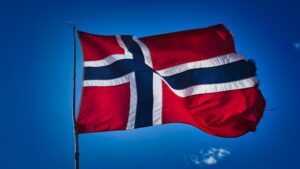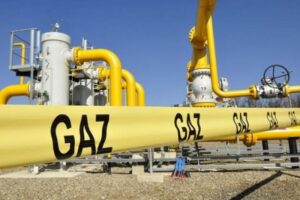
Norway is providing an additional NOK1 billion ($95 million) to finance gas imports to Ukraine to ensure adequate supplies for households, businesses and industry in the country, the Norwegian government said on Wednesday.
“A more secure energy supply is essential for Ukraine’s resilience. This was one of the topics discussed during President Zelensky’s visit to Norway last week. There is an urgent need to increase funding for gas imports to provide electricity and heating for homes, businesses and public institutions. Norway is doing its part to meet this need,” said Prime Minister Jonas Gahr Støre.
The new financing will be channelled through the European Bank for Reconstruction and Development (EBRD) and will be used to purchase gas from Western sources. The recipient of the gas will be the Ukrainian state-owned company Naftogaz. The imported gas will be used to meet consumption needs and increase gas reserves in case of further attacks on gas infrastructure. The financing is provided under the Nansen Support Program for Ukraine, and NOK1 billion is taken from the 2025 energy sector allocation for Ukraine.
“Access to electricity is essential to ensure the security of the Ukrainian people and to ensure the continued functioning of society. The attacks on Ukraine’s energy supply are and have been an attack on the very core of Ukrainian society. They are part of an attempt to weaken the Ukrainian economy and undermine the confidence of the Ukrainian people in their government. That is why it is crucial and strategic to help preserve access to gas,” said Foreign Minister Espen Barth Eide, who is visiting Ukraine this week.
The additional allocation will bring Norway’s total contribution to Ukraine’s gas purchases from 2022 to NOK3.6 billion ($342 million). In 2023, NOK635 million was allocated for gas purchases. The funds have already been released and can be used to increase the total contribution. Thus, the total amount of the agreement is NOK1.635 billion ($155 million).
“We don’t know yet how much gas Ukraine will need to import this year, but Norway’s contribution will enable Ukraine to better cope with the consequences of new attacks from Russia and make the necessary preparations for next winter,” Eide said.
The EBRD has been cooperating with Naftogaz for several years, in particular on corporate governance. Channelling funds through the EBRD helps to reduce risks, such as the risk of corruption and financial irregularities, the statement said.
As reported, Ukrainian Prime Minister Denys Shmyhal on Wednesday discussed joint humanitarian programs and sanctions against Russia with Norwegian Foreign Minister Espen Barth Eide and Norwegian Minister of Labor and Social Inclusion Tonje Brenna. The prime minister also thanked Norway for its assistance in the energy sector, in particular for its readiness to make a EUR140 million contribution through the EBRD for the purchase of gas for Ukrainian gas storage facilities.

Industrial production in Ukraine increased by 3.6% in 2024, while in 2023, according to revised data, the growth was 6.8% after a 36.7% drop in 2022, the State Statistics Service (Ukrstat) reported on Wednesday.
At the same time, according to the State Statistics Service, industrial production in Ukraine decreased by 3.3% in December 2024 compared to December 2023, and by 0.4% in November.
The State Statistics Service reminds that last year, from January to May, industrial production grew: after a jump of 17.2% in January, the recovery slowed to 3.6% in May, in the summer, a decline was recorded from 0.3% in June to 1.5% in July and 4.3% in August, after which it was followed by a slight increase of 1.3% and 0.9% in September and October, respectively.
According to the statistics agency, in 2024, industrial production in mining and quarrying increased by 3.3%, in manufacturing by 5.3%, while the supply of electricity, gas and steam decreased by 2.7% due to a 6.3% drop in electricity production, although gas production increased by 5%.
It is noted that the production of metal ores grew the most – by 23.0%, other minerals and quarrying – by 16.3%, while oil and gas – by only 0.7%, and coal – decreased by 11.7%.
In manufacturing, the largest growth was recorded in metallurgy and production of metal products – 22.5%, clothing production – 19.6%, and furniture – 7.3%. The production of food, beverages and tobacco products increased by 6.2%, textiles by 4.7%, rubber and plastics by 3.4%, pharmaceuticals by 1.9%, and paper and paper products by 1.4%.
At the same time, machine building in 2024 fell by 1.2%, woodworking by 8.8%, chemical production by 9.9%, automotive by 17%, and production of computers, electronic and optical products by 19%.
In nominal terms, in 2024, Ukraine sold industrial products (goods and services) worth UAH 3.657 trillion, which is 11.8% more than in 2023, including UAH 680.3 billion worth of exports (an increase of 24.4%).
In total sales of industrial products in 2024, the manufacturing industry accounted for the largest share (59.9% vs. 56% in 2023), supply of electricity, gas, steam and air conditioning (27.2% vs. 31.2% in 2023), mining and quarrying (remained at 11.7%), and water supply, sewerage and waste accounted for another 1.2% (1.1%).

Ukraine needs to import 4.5-4.6 billion cubic meters of natural gas by November 1 of this year before the start of the next heating season.
This was announced by Dmytro Abramovich, a member of the Board and Commercial Director of Naftogaz Group, at a meeting of the Verkhovna Rada Committee on Energy, Housing and Utilities on Wednesday.
“Naftogaz is already contracting for April, May and the following months, we are not stopping, realizing that by November 1 of this year, if we want to reach the balance sheet indicators comparable to last year, we need 4.5-4.6 billion cubic meters of gas,” he said.
According to the commercial director, Naftogaz has already imported almost 800 million cubic meters of gas in February-March this year.
“This is a technological import, because it cannot be said to be for final consumption – another resource is commercially consumed – but this resource was necessary for balancing the system and daily withdrawal,” Abramovich explained.
According to the company, Ukrainian consumers consumed 14.86 billion cubic meters during the heating period in November-March 2024-25, while the balance plan of the Ministry of Energy of Ukraine was 14.73 billion cubic meters. At the same time, the level of consumption was 680 million cubic meters or 5% higher than in the same period in 2023-24.
According to the commercial director, during the last heating season, Ukraine also lost 700 million cubic meters of its own gas production as a result of Russian shelling.
“We lost almost 700 million cubic meters of gas during the heating season for obvious reasons. Until February 1, we were doing better than planned according to the country’s balance sheet, but the shelling happened and we lost a very large part of production,” he said.
According to Abramovich, Ukraine is also planning to reach 500 million cubic meters less gas reserves in underground gas storage facilities (UGS) during the current heating season than planned in the balance sheet.
At the same time, gas consumption in 2025 in the country will be comparable to last year and will amount to 20.6-20.8 billion cubic meters.
“We see this in the trend, in the current consumption dynamics, so the main task is to work on energy saving and on the restoration of production and continue imports,” summarized the commercial director.
As reported with reference to Prime Minister Denys Shmyhal, the European Bank for Reconstruction and Development (EBRD) on Wednesday approved a loan for Naftogaz of Ukraine for the purchase of natural gas for the next two heating seasons in the amount of up to EUR270 million. Additionally, about EUR140 million in grants from the Norwegian government will be channelled through the EBRD.
According to Shmyhal, this resource will help Ukraine accumulate gas reserves in underground storage facilities for the next heating season.

The volume of freight traffic in January-December 2024 increased by 7.8% compared to the same period of 2023 – up to 354 million tons.
Such preliminary data was reported by the State Statistics Service (Gosstat). According to its data, cargo turnover for the year increased by 13% – up to 184581 million tons/km.
In addition, the number of transported passengers in 2024 increased by 6.8% – up to 2.176 billion.
Passenger turnover increased by 10% – up to 43385 million passenger kilometers.
The data are given without taking into account the territories temporarily occupied by the Russian Federation and part of the territories where hostilities are (were) conducted.

Andriy Ozeychuk, Director of the engineering and construction company Rauta, Chairman of the Board of Directors of the Ukrainian Steel Construction Center Association
What does Regulation 305 provide for?
On January 1, 2023, the Law “On placing construction products on the market” came into force in Ukraine, implementing the provisions of EU Regulation 305/2011 and significantly changing the requirements for the safety and quality of construction materials. By January 1, 2026, all Ukrainian producers must fully adapt to the requirements of the new law.
Cabinet of Ministers Resolution No. 426 extends the law to almost all construction products, from fasteners to chimneys.
New declaration system in Ukraine
The main difference between the new regulation and the previous one, which has been in effect since 2006, is the reference to European standards for the production of construction materials. From now on, Ukrainian producers must declare that their products comply with European standards and bear full responsibility for their quality.
Previously, the quality of products was confirmed by certificates in accordance with Ukrainian standards or technical specifications, which allowed for low-quality products. It was enough for manufacturers to register their own TUs or obtain a certificate from an accredited organization, relieving them of much of the responsibility for the characteristics of materials.
With the adoption of the new law, manufacturers are required to issue declarations of conformity based on the requirements of harmonized European standards. They must also ensure continuous quality control in production and take full responsibility for the declared characteristics.
Benefits of implementing Regulation 305
– Improved quality of building materials. New requirements oblige manufacturers to comply with European standards, which guarantees a higher level of product quality and safety.
– Protection of consumer rights. The introduction of a unified quality control system and liability mechanism will provide buyers with clear selection criteria and tools to influence unscrupulous producers.
– Access to the EU market. Thanks to a unified certification system, Ukrainian companies will be able to export their products to Europe without additional testing and conformity assessment procedures.
– Transparency of the construction materials market. Declarations of conformity will have to be registered in the Unified State Electronic System in the field of construction, which will promote openness and trust between producers, consumers and government agencies.
Risks of implementing Regulation 305
– Increased competition. European producers will be able to enter the Ukrainian market freely without additional certification, which may put pressure on national producers.
– Closure of some enterprises. Companies with outdated equipment may not be able to meet the new standards, forcing them to invest in modernization or cease operations. According to expert estimates, this risk will affect no more than 1% of Ukraine’s production capacity and will not have a significant impact on the industry.
Changes in European legislation
On November 27, 2024, the European Union adopted a new Regulation No. 2024/3110, which replaces the previous Regulation No. 305/2011. It entered into force on January 7, 2025, with a 1-year transitional period. It was Regulation 305/2011 that was the basis for the Ukrainian law “On placing construction products on the market”.
The main changes of the EU Regulation 2024:
– Increased environmental requirements. Manufacturers are obliged to assess the life cycle of building materials and their carbon footprint, which will promote the reuse and recycling of resources.
– Introduction of digital product passports. The Ukrainian law partially takes this provision into account, as it requires registration of declarations in the Unified State Electronic System in the field of construction.
– Simplification of requirements for small and medium-sized businesses to provide construction products on the market.
– Strengthening market surveillance. The regulatory authorities have been given more powers to check product quality and mechanisms to quickly withdraw non-compliant products from the market.
Conclusion.
The transition of Ukrainian producers to work in accordance with the requirements of the new law is an important step in the EU’s approximation. The new rules will encourage businesses to improve their production processes and invest in modernization, which will improve product quality and expand opportunities for domestic producers in the European market.

TK-Domashniy Textile (TK-DT), a member of the Textile-Contact Group (TC Group), has launched a new project, the cost of which is estimated at about $400 thousand, to produce various types of synthetic winterizer in Chernihiv, said Volodymyr Martsenyuk, managing partner of TK-DT.
“We have been thinking for many years about whether to launch another production facility. This decision was made at the end of 2023. We signed a contract with a Chinese company to supply equipment….. At the beginning of this year, we put the equipment into operation, worked on trial samples and have been fulfilling production tasks for a month now,” he said in an exclusive interview with Interfax-Ukraine.
According to him, the advantage of Chinese equipment is primarily in its price, which is three times lower than that of European manufacturers, although it has a shorter service life.
“In total, $350,000 has already been spent on the project, but I think that when we finish, it will cost $400,000, which is a lot of money for any medium-sized business,” Martsenyuk said, adding that partners had to be involved in the project.
According to him, the decision to start producing fillers was dictated, among other things, by the fact that fillers account for 20-25% of the cost of both outerwear and home textiles.
“Since we are one of the largest home textile producers in Ukraine, we used to spend a lot of money annually on the purchase of these fillers,” explains Martsenyuk.
In addition, the delivery of products from fillers’ manufacturers accounts for up to 10% of the cost price.
According to him, today only Ukrainian producers are present on the market of such fillers, and there are many of them.
The managing partner of TK-DT noted that the new production facility can produce fillers with a width of 2.6 m and a production capacity of 300 kg/hour.
“We can produce classic synthetic winterizer, siliconized (synthetic winterizer treated with silicone, which makes it soft, fluffy, and elastic), woolen winterizer, a mixture of natural wool and synthetic fibers that is often used as a filler for pillows, blankets, and jackets; and cotton winterizer,” he said.
Mr. Martsenyuk clarified that the market for nonwoven filler is currently very large.
“We can hardly estimate the share we plan to take. I think we may have one production out of 50 in Ukraine. I understand that there may be 10 or so equally serious large-scale production facilities, but there are also medium-sized and small-scale facilities, so there are enough of them,” he says.
Among the advantages of the company’s fillers, he mentioned the fact that the company buys only virgin fiber from China as raw material, while most companies process secondary fiber – recycled polyester made from PET bottles (so-called recycling).
Currently, the new production facility is planned to use 50% of its output for its own needs and sell 50% on the market.
“TK Home Textile is a leader in the production of fabrics, home textiles, and children’s products in Ukraine. Its portfolio of assets includes one of the few cotton fabric finishing plants in Ukraine, TK-DT Chernihiv, in Chernihiv. Its other assets include garment factories in Kyiv, Ternopil, Chernihiv and Odesa; a footwear factory in Chyhyryn; and a knitting production facility.
TK Group was founded in 1995. Today, it is a holding company that unites the entire range of textile industry services – from raw materials and yarns to ready-made solutions for B2B, B2G, and B2C customers.